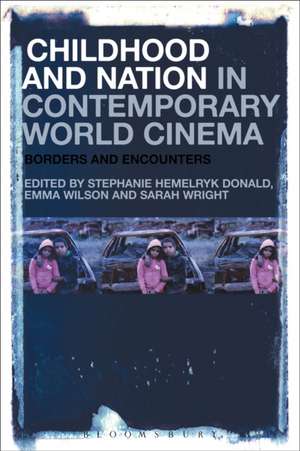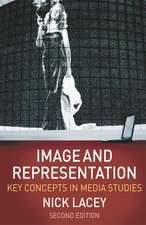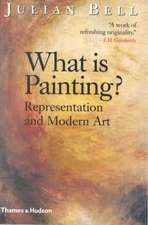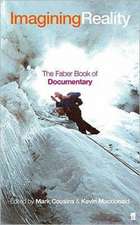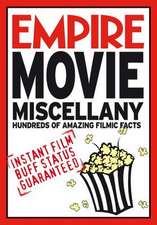Childhood and Nation in Contemporary World Cinema: Borders and Encounters
Editat de Dr. Stephanie Hemelryk Donald, Professor Emma Wilson, Dr. Sarah Wrighten Limba Engleză Hardback – 8 feb 2017
| Toate formatele și edițiile | Preț | Express |
|---|---|---|
| Paperback (1) | 238.29 lei 6-8 săpt. | |
| Bloomsbury Publishing – 22 aug 2018 | 238.29 lei 6-8 săpt. | |
| Hardback (1) | 772.98 lei 6-8 săpt. | |
| Bloomsbury Publishing – 8 feb 2017 | 772.98 lei 6-8 săpt. |
Preț: 772.98 lei
Preț vechi: 1112.44 lei
-31% Nou
Puncte Express: 1159
Preț estimativ în valută:
147.91€ • 154.84$ • 122.39£
147.91€ • 154.84$ • 122.39£
Carte tipărită la comandă
Livrare economică 07-21 aprilie
Preluare comenzi: 021 569.72.76
Specificații
ISBN-13: 9781501318580
ISBN-10: 1501318586
Pagini: 296
Ilustrații: 40 bw illus
Dimensiuni: 152 x 229 x 18 mm
Greutate: 0.48 kg
Editura: Bloomsbury Publishing
Colecția Bloomsbury Academic
Locul publicării:New York, United States
ISBN-10: 1501318586
Pagini: 296
Ilustrații: 40 bw illus
Dimensiuni: 152 x 229 x 18 mm
Greutate: 0.48 kg
Editura: Bloomsbury Publishing
Colecția Bloomsbury Academic
Locul publicării:New York, United States
Caracteristici
Book-length volume that brings together the vexed, but still pertinent, concepts of national cinema with language cinema (Chinese, Spanish, English, French, Arabic) and world cinema
Notă biografică
Stephanie Hemelryk Donald is Distinguished Professor of Film at The University of Lincoln, UK. She is the author of Public Secrets, Public Spaces: Cinema and Civility in China (2000) and Little Friends: Children's Film and Media Culture in New China (2005), as well as many edited collections including Inert Cities: Globalization, Mobility and Suspension in Visual Culture (2014). Emma Wilson is Professor of French Literature and the Visual Arts at Corpus Christi College, UK.Sarah Wright is Reader in Hispanic Studies at Royal Holloway, University of London, UK.
Cuprins
Introduction: nation, film, child Stephanie Hemelryk Donald (University of New South Wales, Australia); Emma Wilson (Corpus Christi College, UK); Sarah Wright (University of London, UK)Home and away1. 'A bath, a toilet and a field': dreaming and deprivation in Lynne Ramsay's RatcatcherVicky Lebeau (University of Sussex, UK)2. Lost and found: children in Indigenous Australian cinemaGreg Dolgopolov (University of New South Wales, Australia)3. 'Away from girlhood': Catherine Breillat's BluebeardEmma Wilson (Corpus Christi College, UK)Disappearance and removal4. The lost children of Latvia: deportees and postmemory in Dzintra Geka's The Children of Siberia Stephanie Hemelryk Donald (University of New South Wales, Australia) and Klara Bruveris (University of New South Wales, Australia)5. Among the Nations: Children as Czechs, Germans and Jews in post-1980 Czech cinematic representations of the Second World WarJan Lánícek (University of New South Wales, Australia)6. Child, cinema, dictatorship: Ignacio Agüero's One Hundred Children Waiting for a TrainSarah Wright (University of London, UK)Education and Serious Games7. Graphic tales: class, violence and South Korean childhood in Sang-Ho Yeon's The King of PigsSusan Danta (University of New South Wales, Australia)Citizenship in the classroom: the politicisation of child subjects in Nicolas Philibert's To Be and To Have and Laurent Cantet's The ClassVictoria FlanaganEducation, destiny, and national identity in Raúl Ruiz's Manoel on the Island of WondersStefan Solomon (University of New South Wales, Australia)An allegorical childhood: identity and coming of age in Terry Loane's Mickybo and MeJennifer R. Beckett (University of Melbourne, Australia)PerformanceTerrorism and trainers in a transnational remake: child labour and commodity culture in the Bollywood adaptation of New Iranian Cinema's Children of HeavenMichael Lawrence (University of Sussex, UK)The child as hyphen: Yamina Benguigui's Inch'allah DimancheHannah Kilduff (University of Cambridge, UK)Beiqing, kuqing and national sentimentality in Liu Junyi's Left-behind ChildrenZitong Qiu and Maria Elena Indelicato (Zhejiang University, China)Children's toys, Argentine nationhood and blondness in Albertina Carri's Barbie Gets Sad Too and Néstor F. and Martín C.'s Easy MoneyJordana Blejmar (University of Liverpool, UK)BibliographyFilmography
Recenzii
This terrific new collection provides the emerging, vibrant, interdisciplinary field of writing on the child in cinema with a welcome new direction. Reflecting upon the shifting global geopolitical boundaries of our everyday world, it provocatively challenges, uncouples and rethinks accepted correlations between cinematic depictions of childhood and nationhood. The scholarship is engaging, often eye opening, in its illumination of the complexities of depictions of children (adopted, deported, disappeared, "left behind"), in cinemas ranging from Bollywood to South Korean animation to Argentine stop-motion to Australian indigenous films. This book will speak to anyone who was ever moved by a film about childhood to reflect on their own history, their own place within the world.
World Cinema is, before anything else, a school in other cultures. Children on screen, in turn, represent processes of learning from the world. In combining childhood, the nation and world cinema, this superb collection takes us on an enlightening journey around the world through the eyes of the child. It teaches us how nations are formed and destroyed, how they affect the world, and how the child is particularly affected as it grows up amidst conflicts, wars and disputes over borders. As the editors of this collection remind us, films become emotionally closer to us when there is a child protagonist, and one could add, a child's lessons on the world are closer to the truth.
The figure of the child has been a potent symbol in many constructions an representations of national identity within various forms of visual media. Covering examples from many different historical and cultural contexts, this edited volume raises ethical challenges about such representations in an intellectually rigorous manner. This is a powerful and timely book with a truly global perspective.
This important and compelling book addresses the place of children in an increasingly troubled world. A much neglected area of study in the history of the cinema, the cinematic child is explored here with great insight and depth of understanding. Childhood and Nation in Contemporary World Cinema offers an original and moving study of the power of cinema to explore ethical issues surrounding the future of the child in nations marked by war, homelessness and the search for identity. The authors explore the concept of the cinematic child from a range of national backgrounds and across a range of themes: sexuality, dispossession, war, migration, suicide, family, identity. A truly inspiring collection, this book is essential reading for anyone interested in cinematic depictions of childhood and the significance of the child in narratives about the future of all nations.
World Cinema is, before anything else, a school in other cultures. Children on screen, in turn, represent processes of learning from the world. In combining childhood, the nation and world cinema, this superb collection takes us on an enlightening journey around the world through the eyes of the child. It teaches us how nations are formed and destroyed, how they affect the world, and how the child is particularly affected as it grows up amidst conflicts, wars and disputes over borders. As the editors of this collection remind us, films become emotionally closer to us when there is a child protagonist, and one could add, a child's lessons on the world are closer to the truth.
The figure of the child has been a potent symbol in many constructions an representations of national identity within various forms of visual media. Covering examples from many different historical and cultural contexts, this edited volume raises ethical challenges about such representations in an intellectually rigorous manner. This is a powerful and timely book with a truly global perspective.
This important and compelling book addresses the place of children in an increasingly troubled world. A much neglected area of study in the history of the cinema, the cinematic child is explored here with great insight and depth of understanding. Childhood and Nation in Contemporary World Cinema offers an original and moving study of the power of cinema to explore ethical issues surrounding the future of the child in nations marked by war, homelessness and the search for identity. The authors explore the concept of the cinematic child from a range of national backgrounds and across a range of themes: sexuality, dispossession, war, migration, suicide, family, identity. A truly inspiring collection, this book is essential reading for anyone interested in cinematic depictions of childhood and the significance of the child in narratives about the future of all nations.
